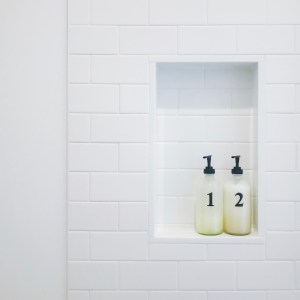






One aspect of having a simple home is to keep it free from clutter. Below are five questions to ask yourself as you assess the items in your home. Items you purge can be sold, donated, recycled or given to family and friends.
1: Would I buy it today for full price? Focus on whether or not you would purchase the item right now. If the item no longer fits your taste, purge it. You don’t need to buy everything at full price, but you should love your stuff enough to be willing to pay full price for it. Freebies and sales are perks to buying something, not the reason you should buy something.
2: Would I keep it if I moved? Would this item be worth packing up, moving and unpacking in a new space? If you would want your next house to be clutter free, your current house can be clutter free, too.
3: Have I used it in the past six months or will I use it in the next six months? Be sure to use the word “will” and not the word “might” for this question. If you do not see yourself using it, it’s time to let it go so someone else can use it.
4: Do I already own an item that serves the same purpose? If you own many versions of an item or similar items, keep the best and purge the rest.
5: Do I feel obligated to keep it? Once something is given to you, it is yours. It is your home and your space, therefore it is your choice whether or not to keep an item. If you don’t love it or use it, but want to remember it, take a photo before purging it.
Happy decluttering!

Christmas is only two weeks from today. For anyone trying to minimize, the holiday season can be overwhelming due to an excess of presents. Below are a few clutter free gift suggestions.
1: Memberships (examples: museum, aquarium)
2: Events (examples: concert, play)
3: Activities (examples: golfing, bowling)
4: Lessons (examples: photography, pottery)
5: Donations (examples: charity, school)
The best gift you can give someone is time. Memories last much longer than things. After all, the holiday season is about spirit and joy, not piles of boxes to unwrap. Prioritize presence over presents. A less materialist Christmas can lead to annual traditions and lasting memories (and less time spent looking for parking and waiting in line at the shopping mall).

Christmas is six weeks from today. Today also marks six months that we have been in our apartment. Adding holiday “stuff” into our small space, and then having to move all of that stuff into our new home in six months, does not sound like fun. This year we are having a minimalist Christmas. Our season will be focused on enjoying the holiday spirit rather than accumulating holiday stuff. Corey and I discussed eliminating all gifts, decorations and cards, but instead, we have decided to allow one of each: one gift (for Willa), one decoration (a Christmas tree) and one card (for Willa’s great grandmother).
Gifts. Gifts are the easiest thing to accumulate over the holidays. But gifts don’t just make a mess once the wrapping paper is all over the floor. They also make a mess months later when they are cluttering the closet, the living room, the dining room… you get the idea. Part of the philosophy of minimalism is that we don’t need a lot of things to be happy. Willa is almost two, and we want her to grow up valuing experiences over material possessions. Of course she will have a few favorite toys, but memories last much longer than things. Shopping for gifts requires a lot of time and money. That time and money can be much better spent simply enjoying family and friends rather than shopping for them.
Decorations. Decorations quickly add clutter to a home. The time and money spent buying, decorating and then storing all those items adds up as well. Decorating can also cause holiday stress. Imagine a Saturday morning in December watching a family Christmas movie rather than untangling lights. Sounds relaxing, right? With only one decoration we are saving our sanity, time and money. Less is more and less to store!
Cards. Cards are fun to receive, however, ordering and mailing cards uses precious time and money. Also, with social media and smartphones, our family and friends already know what we’ve been up to the past twelve months. The majority of holiday cards wind up in the trash. By opting out of sending cards we are saving time, money and the environment. This year we are going to use that $100 (stamps are expensive!) to make a donation instead.
Minimalism isn’t about getting rid of all your belongings and all your commitments. It’s about eliminating belongings and commitments that do not bring you joy, and getting rid of what’s not important (stuff) to help us focus on what is important (family and friends). This year we are slowing down and letting ourselves enjoy a minimalist holiday.
Error: No feed found.
Please go to the Instagram Feed settings page to create a feed.